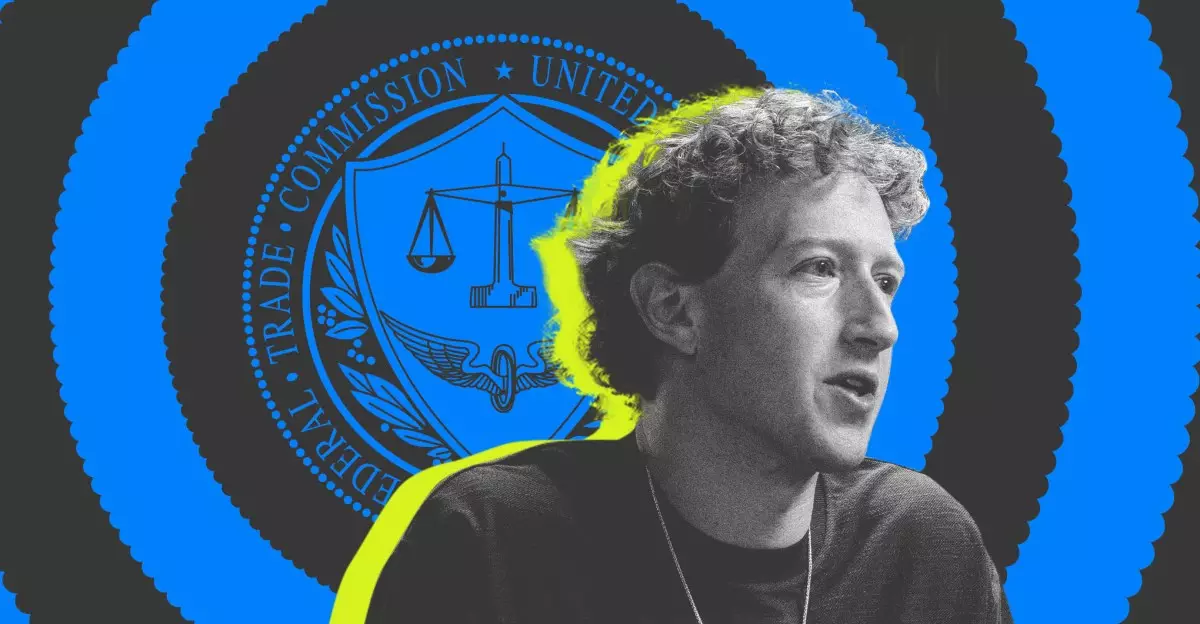The saga of Meta’s evolution is one filled with what-ifs and missed opportunities. Founded in the depths of a college dorm room, this once-simple platform for college students morphed into a trillion-dollar social media conglomerate. At the helm is Mark Zuckerberg, a visionary driven as much by ambition as by the fear of obsolescence. As he stands in a federal courthouse amid an antitrust battle with the Federal Trade Commission (FTC), he reflects on pivotal decisions that could have dramatically altered the company’s trajectory.
The Crossroads of Competition
Meta’s journey is marked by critical junctures that reflect both strategic genius and the vulnerability of its market position. During Zuckerberg’s testimony, he shed light on the fierce competition that continually loomed over the company. The FTC’s theory suggests that Meta’s acquisitions of Instagram and WhatsApp were not merely business moves; they were preemptive strikes against potential rivals that threatened its monopoly on social networking. This perspective highlights an aggressive approach that ultimately redefined the landscape of digital communication.
Zuckerberg, however, paints a counter-narrative. He posits that the competitive environment is dynamic—a world where TikTok, YouTube, and even iMessage act as formidable challengers. His insistence on a “fluid” market exposes the underlying tension of the courtroom proceedings: is Meta the reigning emperor of social media or a player surviving in an ever-shifting digital arena? The stark difference in viewpoints between the FTC and Zuckerberg underscores the complex interplay of market definitions and the future of tech competition.
Alternative Realities: Missed Opportunities and Potential Paths
If hindsight is 20/20, then Zuckerberg’s courtroom musings provide fertile ground for contemplation. Among the most striking alternatives he mentioned was the potential acquisition of Snapchat, an offer rejected by CEO Evan Spiegel. Imagine a Meta that integrated Snapchat’s ephemeral content and user engagement into its ecosystem. This could have bolstered its advertising strategy even further, crafting a monopoly that many argue is already in place.
Zuckerberg’s speculation went beyond just hypothetical acquisitions. He considered radical shifts like wiping Facebook’s friend lists to rejuvenate user interaction, suggesting an awareness of the user fatigue that can accompany lengthy tenure on social media platforms. His ruminations reveal a leader willing to contemplate drastic measures—not out of a desire for recklessness, but embodying the innovative spirit. Yet, the mere thought of pursuing such radical changes raises questions about user trust and brand loyalty, elements that can evaporate quickly in the digital age.
The Driving Force of Advertising Strategy
As Meta’s industry influence grew, so did its advertising model. Zuckerberg disclosed that the company had contemplated an experience dominated entirely by ads, which some users found indistinguishable from traditional content. The intention to maximize revenue through an increased ad load was not merely a strategy; it was a reflection of existential pressure. As users flocked to alternatives, Meta’s survival instincts led to a reliance on aggressive monetization strategies. This aspect of Zuckerberg’s testimony raises ethical considerations regarding user experience versus shareholder demands.
The conversation surrounding ad load taps into broader discussions about the evolving relationship between tech companies and their users. While Meta’s advertising practices have undoubtedly generated colossal revenues, they’ve also attracted criticisms about user exploitation and data harvesting, drawing a clear line between profit motivation and corporate responsibility.
The Corporate Culture Behind Decision-Making
The inner workings of Meta are illuminated by internal documents presented during the trial, giving an authentic glimpse into Zuckerberg’s mindset. The fear of losing relevance to burgeoning platforms like Instagram or Snapchat loomed large, compelling him and his executive team to make decisions that appeared defensive rather than visionary. This highlights another layer of complexity: Meta’s culture fosters a reactive, often insular approach toward market challenges, despite presenting itself as an innovative leader.
These internal dialogues reflect a corporate ethos that can prioritize immediate concerns over long-term innovation. The concern for falling behind showcases a paramount fear in Silicon Valley: obsolescence. The question remains: can a company built on reactionary strategies truly lead in innovation when its decisions stem from reactions to competitors rather than a clear, forward-thinking vision?
In sum, Zuckerberg’s court appearances and the scrutiny from the FTC reveal a tumultuous narrative encompassed by struggle for market dominance, ethical responsibilities in advertising, and the relentless tempo of technological advancement. As Meta contemplates its future, it does so amid the weight of its past choices, each one meticulously dissected and analyzed in a setting that could define its very existence.

